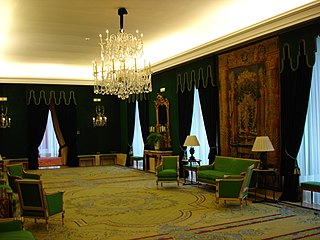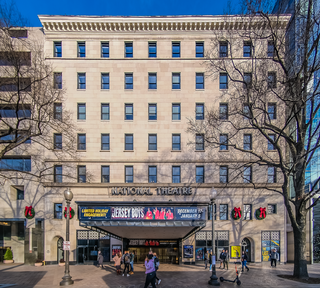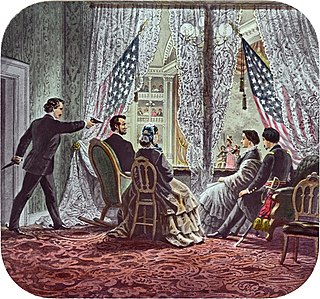Related Research Articles

John Wilkes Booth was an American stage actor who assassinated United States President Abraham Lincoln at Ford's Theatre in Washington, D.C., on April 14, 1865. A member of the prominent 19th-century Booth theatrical family from Maryland, he was a noted actor who was also a Confederate sympathizer; denouncing President Lincoln, he lamented the then-recent abolition of slavery in the United States.

Edwin Thomas Booth was an American actor who toured throughout the United States and the major capitals of Europe, performing Shakespearean plays. In 1869, he founded Booth's Theatre in New York. Some theatrical historians consider him the greatest American actor, and the greatest Prince Hamlet, of the 19th century. His achievements are often overshadowed by his relationship with his younger brother, actor John Wilkes Booth, who assassinated the 16th president of the United States, Abraham Lincoln.

Junius Brutus Booth was an English stage actor. He was the father of actor John Wilkes Booth, the assassin of U.S. President Abraham Lincoln. His other children included Edwin Booth, the foremost tragedian of the mid-to-late 19th century, Junius Brutus Booth Jr., an actor and theatre manager, and Asia Booth Clarke, a poet and writer.

Joseph Jefferson III, often known as Joe Jefferson, was an American actor. He was the third actor of this name in a family of actors and managers, and one of the most famous 19th century American comedians. Beginning as a young child, he continued as a performer for most of his 76 years. Jefferson was particularly well known for his adaptation and portrayal of Rip Van Winkle on the stage, reprising the role in several silent film adaptations. After 1865, he created no other major role and toured with this play for decades.

In show business, the green room is the space in a theatre or similar venue that functions as a waiting room and lounge for performers before, during, and after a performance or show when they are not engaged on stage. Green rooms typically have seating for the performers, such as upholstered chairs and sofas.

Laura Keene was a British stage actress and theatre manager. In her twenty-year career, she became known as the first powerful female manager in New York. She is most famous for being the lead actress in the play Our American Cousin, which was attended by President Abraham Lincoln at Ford's Theater in Washington on the evening of his assassination.
Running crew, run crew or stage crew, is a collective term used in the theatre to describe the members of the technical crew who supervise and operate ("run") the various technical aspects of the production during a performance. While the "technical crew" includes all persons other than performers involved with the production, such as those who build and take down the sets and place the lighting, the term "running crew" is generally limited to those who work during an actual performance.

In a theatre, the prompt corner or prompt box is the place where the prompter—usually the stage manager in the US or deputy stage manager in the UK—stands in order to coordinate the performance and to remind performers of their lines when required. It is traditionally located at stage left.

A theater, theatre, or playhouse, is a structure where theatrical works, performing arts, and musical concerts are presented. The theater building serves to define the performance and audience spaces. The facility usually is organized to provide support areas for performers, the technical crew and the audience members, as well as the stage where the performance takes place.

The National Theatre in the United States is located in downtown Washington, D.C., just east of the White House, and functions as a venue for live stage productions with seating for 1,676. Despite its name, it is not a governmentally funded national theatre, but operated by a private, non-profit organization.

On April 14, 1865, Abraham Lincoln, the 16th president of the United States, was assassinated by well-known stage actor John Wilkes Booth while attending the play Our American Cousin at Ford's Theatre in Washington, D.C. Shot in the head as he watched the play, Lincoln died of his wounds the following day at 7:22 am in the Petersen House opposite the theater. He was the first U.S. president to be assassinated. His funeral and burial were marked by an extended period of national mourning.

Edman "Ned" Spangler, baptized Edmund Spangler, was an American carpenter and stagehand who was employed at Ford's Theatre at the time of President Abraham Lincoln's murder on April 14, 1865. He and seven others were charged in conspiring to assassinate Lincoln and three other high level government officials. Spangler was the only one found not guilty of the conspiracy charge. Even so, he was found guilty of helping Lincoln's assassin, John Wilkes Booth, escape and sentenced to six years of hard labor.
There are different types of theatres, but they all have three major parts in common. Theatres are divided into two main sections, the house and the stage; there is also a backstage area in many theatres. The house is the seating area for guests watching a performance and the stage is where the actual performance is given. The backstage area is usually restricted to people who are producing or in the performance.

Booth's Theatre was a theatre in New York built by actor Edwin Booth. Located on the southeast corner of 23rd Street and Sixth Avenue, Booth's Theatre opened on February 3, 1869.

The first theatre in New York City to bear the name The Winter Garden Theatre had a brief but important seventeen-year history as one of New York's premier showcases for a wide range of theatrical fare, from variety shows to extravagant productions of the works of Shakespeare. Initially known as Tripler's Hall or Metropolitan Hall, it burned down in 1854 and was rebuilt as The New York Theatre. Although it burned to the ground several times, it rose from the ashes under different managers, bearing various names, to become known as one of the most important theatres in New York history.
George Augustus Parkhurst was an American stage actor who was one of the last surviving members of the company of actors present on the night of April 14, 1865, when John Wilkes Booth assassinated President Abraham Lincoln during their performance of Our American Cousin. Late in his life Parkhurst created the role of Hobbs in the 1888 American debut of Little Lord Fauntleroy.
Pleasure Man is a 1928 drama/murder mystery play by Mae West.

Barney Williams was an Irish-American actor-comedian popular during the mid decades of the 19th century. He was probably best remembered by audiences of the day for playing Ragged Pat in J. A. Amherst's drama Ireland as it is and the title role in Samuel Lover's comic opera Rory O'More. Throughout the greater part of his career he was billed along with his wife, the former Maria Pray, as Mr. and Mrs. Barney Williams.

Harry Hawk was an American actor and comedian, remembered as the only performer on stage at Ford's Theatre at the moment Abraham Lincoln was shot on April 14, 1865.

Olympic Theatre was the name of five former 19th and early 20th-century theatres on Broadway in Manhattan and in Brooklyn, New York.
References
- ↑ Bax, Peter. "The Dress Rehearsals". Stage Management. Ayer Publishing. 1977. p. 227.
- ↑ "The Call Boy's Story". The New York Times . Apr. 18, 1915. p. X 6.